The foremost journal of tropical medicine in the United States has published a supplement honoring the public health legacy of former President Jimmy Carter and the late First Lady Rosalynn Carter. In a demonstration of technical expertise and the respect The Carter Center carries in that field, the supplement features 16 articles authored or co-authored by Carter Center experts. Learn more »
Helping countries control or eliminate diseases is no easy feat — helping them do so when they’re in the midst of armed conflict is exponentially more challenging. Learn more »
The Carter Center sent a large contingent to the 72nd Annual Meeting of the American Society of Tropical Medicine and Hygiene (ASTMH), held Oct. 18-22 in Chicago. Learn more »
Jude Musa, 13, from a small community in Nigeria, stood proudly in 2016 as he received a dose of anti-parasite medicine. It was part of a ceremony marking the 500 millionth treatment The Carter Center has helped distribute to fight neglected tropical diseases. Learn more about the celebration and NTDs from our archives. Learn more »
By Dr. Kashef Ijaz, Vice President, Health Programs, The Carter Center; Kelly Callahan, M.P.H., Director, Trachoma Control Program, The Carter Center; Dr. Emmanuel Miri, Nigeria Country Representative, The Carter Center; Dr. Zerihun Tadesse, Ethiopia Country Representative, The Carter Center
From the vantage point of a richly resourced and powerful country or society, it’s easy to believe that colonialism is a thing of the past. Unfortunately, that is not the case. The sad fact is that the effects of a colonial mind-set are alive and well in some corners of the global health community. Learn more »
By Paige Alexander, chief executive officer of The Carter Center
This month, I was pleased to sign the Kigali Declaration on Neglected Tropical Diseases, signifying the Carter Center’s 100% commitment to work with dozens of countries, donors, and organizational partners to tackle these terrible diseases Learn more »
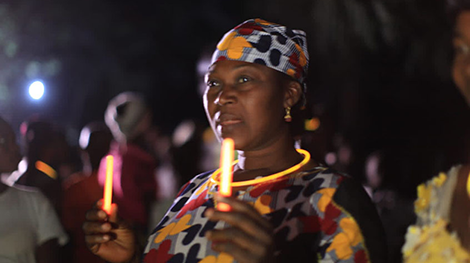 Jan. 30, 2022, marked the third annual World NTD Day, highlighting the global community’s commitment to ending neglected tropical diseases (NTDs) that cause immeasurable suffering among the world’s most marginalized communities. Together The Carter Center and our partners lit up the world as we celebrated hard-earned progress and took action to #EndtheNeglect and #BeatNTDs.
Learn more »
Jan. 30, 2022, marked the third annual World NTD Day, highlighting the global community’s commitment to ending neglected tropical diseases (NTDs) that cause immeasurable suffering among the world’s most marginalized communities. Together The Carter Center and our partners lit up the world as we celebrated hard-earned progress and took action to #EndtheNeglect and #BeatNTDs.
Learn more »
By Paige Alexander, chief executive officer, and Kashef Ijaz, vice president, Health Programs
The 76th Session of the United Nations General Assembly opens Tuesday, Sept. 14. It is a time of great anticipation as representatives of 193 member states come together in the great hall to discuss issues and set an agenda for the coming year. World political leaders, including President Joe Biden, will give speeches that will be closely watched for clues and outright declarations regarding a wide variety of international challenges, global health among them. Learn more »
By Dr. Kashef Ijaz, vice president, health programs
The Carter Center’s neglected tropical disease programs treat and prevent Guinea worm disease, trachoma, river blindness, lymphatic filariasis, and schistosomiasis, with the goal to control, eliminate, and eradicate. Beyond the alleviation of the human suffering caused by these illnesses, this work brings ancillary benefits to communities, health systems, and infrastructure that may be just as important. Learn more »
By Paige Alexander, chief executive officer, and Kashef Ijaz, vice president, health programs
The world’s most vulnerable people work hard every day to overcome poverty and disease. They aren’t interested in handouts, but with a hand up they can get the resources they need to surmount obstacles to prosperity and peace. Learn more »
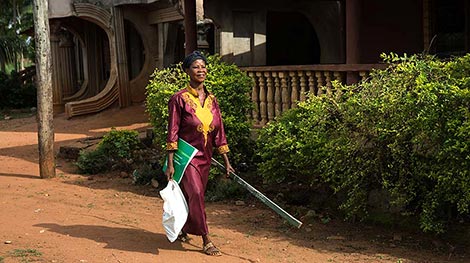 Mass drug administration, in which entire communities receive drug treatment to halt disease transmission, was interrupted or delayed, but intense work went on behind the scenes to develop sets of COVID-safe procedures.
Learn more »
Mass drug administration, in which entire communities receive drug treatment to halt disease transmission, was interrupted or delayed, but intense work went on behind the scenes to develop sets of COVID-safe procedures.
Learn more »
Growing up, Greg Noland voraciously read National Geographic magazines. From his home near Dallas, Texas, Noland became fascinated with other cultures and seeing the world. Learn more »
By Dr. Kashef Ijaz, vice president, health programs
The observance of World Neglected Tropical Disease Day on Jan. 30 (following the public launch of the 2030 NTD Road Map by the WHO on Jan. 28) prompts me to reflect on my good fortune in overseeing the Carter Center’s tireless work to free people from an array of illnesses that cause untold misery and perpetuate the cycle of poverty. Learn more »
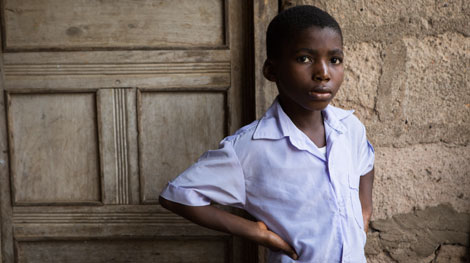 Ten-year-old Gideon Abraham and his brother Odenaka, 12, and sister Blessing, 7, had come to live with their grandmother in Amagunze, Enugu state, Nigeria, in the middle of the school year. They are bright children, and getting in sync with their new school’s lessons was the easy part. Gideon wants to fly airplanes when he grows up — and perhaps become president of Nigeria.
Learn more »
Ten-year-old Gideon Abraham and his brother Odenaka, 12, and sister Blessing, 7, had come to live with their grandmother in Amagunze, Enugu state, Nigeria, in the middle of the school year. They are bright children, and getting in sync with their new school’s lessons was the easy part. Gideon wants to fly airplanes when he grows up — and perhaps become president of Nigeria.
Learn more »
Dr. Frank Richards, who directs the Carter Center’s programs on river blindness, lymphatic filariasis, and schistosomiasis, explains why health education matters in the fight to eliminate diseases. Learn more »
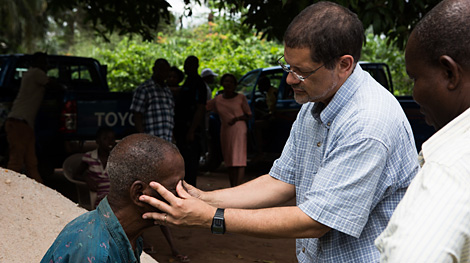 From Guatemala to Nigeria and beyond, Dr. Frank O. Richards Jr. has dedicated most of his adult life to freeing people from the miseries of river blindness. He has been director of the Carter Center’s River Blindness Elimination program since its inception in 1996.
Learn more »
From Guatemala to Nigeria and beyond, Dr. Frank O. Richards Jr. has dedicated most of his adult life to freeing people from the miseries of river blindness. He has been director of the Carter Center’s River Blindness Elimination program since its inception in 1996.
Learn more »
By Dean G. Sienko, M.D., M.S., vice president, Carter Center Health Programs
I’m the new guy around here. Although I’ve visited and worked in many places during my medical career – including multiple overseas deployments with the U.S. Army – my first trip abroad with The Carter Center was a new highlight. Learn more »
Thirteen-year-old Jude Musa looked serious, even stoic, as a volunteer from his village gauged his height with a measuring stick. Community drug distributor Yusuf Maikeffi determined the proper dose of praziquantel and handed the tablets to the boy, who popped them into his mouth and chased them with fresh water from a plastic pouch. Learn more »
By Ambassador (ret.) Mary Ann Peters, chief executive officer
As I write this, The Carter Center is closing in on the distribution of its 500 millionth dose of drugs to combat neglected tropical diseases. That’s half a billion doses of medication given to tens of millions of people suffering or at risk for river blindness, trachoma, lymphatic filariasis, and schistosomiasis. Big institutional milestones are the result of small individual efforts. Learn more »
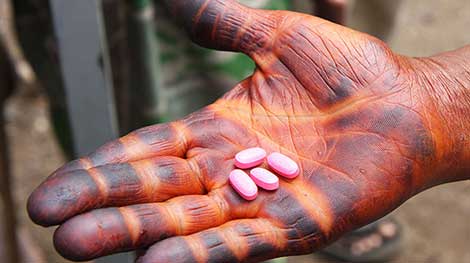 The Carter Center in 2016 surpassed 500 million doses of medication distributed to fight neglected tropical diseases.
Learn more »
The Carter Center in 2016 surpassed 500 million doses of medication distributed to fight neglected tropical diseases.
Learn more »
In 2014, Carter Center health programs assisted in the distribution of more drug treatments for neglected tropical diseases (NTDs) than in any previous year, demonstrating the Center’s commitment to alleviating suffering and improving the lives of those who live in the world’s poorest and most isolated communities. Learn more »
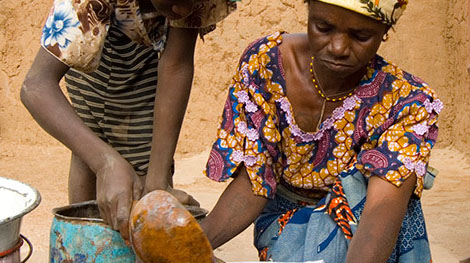 A leader in the eradication and elimination of diseases, The Carter Center is fighting six preventable diseases — Guinea worm, river blindness, trachoma, schistosomiasis, lymphatic filariasis, and malaria — by using health education and simple, low-cost methods.
The following slideshow illustrates some of the fundamental tools and approaches used by The Carter Center to help build a healthier and more peaceful world.
Learn more »
A leader in the eradication and elimination of diseases, The Carter Center is fighting six preventable diseases — Guinea worm, river blindness, trachoma, schistosomiasis, lymphatic filariasis, and malaria — by using health education and simple, low-cost methods.
The following slideshow illustrates some of the fundamental tools and approaches used by The Carter Center to help build a healthier and more peaceful world.
Learn more »
By Lindsay Rakers, senior program associate for The Carter Center
Eight years ago, the urine of 12-year-old Jude Ogwu was consistently red from blood. His father, chief of Aboh, a village in southeast Nigeria, took him to the hospital for treatment but received none. The hospital lacked medicine and the resources needed to treat Ogwu, who was suffering. Learn more »
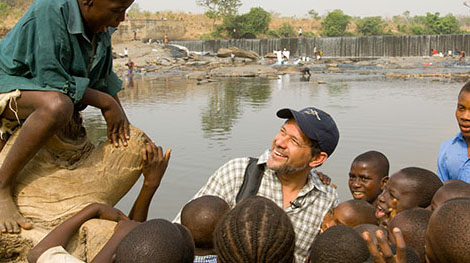 In Guatemala 25 years ago, on a coffee farm situated at the slope of a volcano, Frank O. Richards Jr., M.D., sat under a thinly thatched roof talking with an old man. Chickens foraged on the dirt floor, and a mangy dog slept in the corner.
Learn more »
In Guatemala 25 years ago, on a coffee farm situated at the slope of a volcano, Frank O. Richards Jr., M.D., sat under a thinly thatched roof talking with an old man. Chickens foraged on the dirt floor, and a mangy dog slept in the corner.
Learn more »
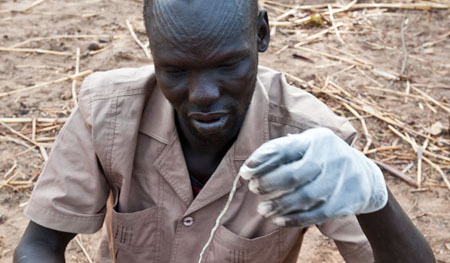 he Carter Center has become a global leader in the eradication and elimination of diseases, focusing efforts to build health and hope in some of the poorest and most isolated places on earth.
Learn more »
he Carter Center has become a global leader in the eradication and elimination of diseases, focusing efforts to build health and hope in some of the poorest and most isolated places on earth.
Learn more »
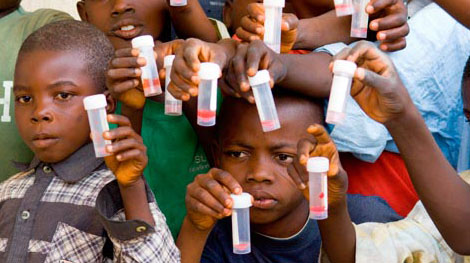 In the blistering heat of Nasarawa North, Nigeria, the cool waters of the River Uke beckon all. Women launder clothes, people bathe, girls fetch water, and children, especially boys, splash and swim for fun.
Learn more »
In the blistering heat of Nasarawa North, Nigeria, the cool waters of the River Uke beckon all. Women launder clothes, people bathe, girls fetch water, and children, especially boys, splash and swim for fun.
Learn more »
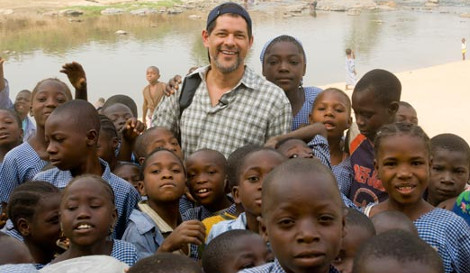 Over the past three years, The Carter Center, in partnership with the Nigeria Ministry of Health, has introduced an innovative way of simultaneously treating several parasitic diseases in Nigeria. In this approach — known as triple-drug treatment — a health worker gives a community member three different medicines at one time that in combination treat river blindness, lymphatic filariasis, schistosomiasis, and several kinds of intestinal worms. In the interview that follows, Frank Richards Jr., M.D., who directs the Center's programs for fighting these diseases, discusses the benefits of the triple-drug approach.
Learn more »
Over the past three years, The Carter Center, in partnership with the Nigeria Ministry of Health, has introduced an innovative way of simultaneously treating several parasitic diseases in Nigeria. In this approach — known as triple-drug treatment — a health worker gives a community member three different medicines at one time that in combination treat river blindness, lymphatic filariasis, schistosomiasis, and several kinds of intestinal worms. In the interview that follows, Frank Richards Jr., M.D., who directs the Center's programs for fighting these diseases, discusses the benefits of the triple-drug approach.
Learn more »
The Carter Center is hosting its 2009 health program reviews March 23-31, 2010, with experts from around the world –including representatives from partner organizations including the Bill & Melinda Gates Foundation, Lions Clubs International, the World Health Organization, UNICEF, and the Centers for Disease Control and Prevention – gathered in Atlanta to assess program status and adopt recommendations for the coming year. Learn more »
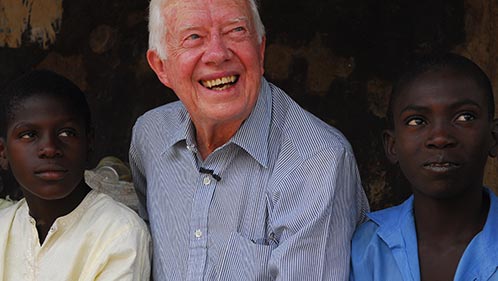 The characteristics of childhood friendship are similar all over the world. In the community of Nasarawa North in Nigeria in 2006, friends 13-year-old Aminu Farouk, 12-year-old Dauda Usman, and 11-year-old Salihu Abdullahi walk to school together, dive in the local reservoir on hot afternoons, and help each other with difficult homework assignments. They also share a deep secret. Each suffers from urinary schistosomiasis, a silent and destructive parasitic infection that leads to poor growth and impaired cognitive function in children.
Learn more »
The characteristics of childhood friendship are similar all over the world. In the community of Nasarawa North in Nigeria in 2006, friends 13-year-old Aminu Farouk, 12-year-old Dauda Usman, and 11-year-old Salihu Abdullahi walk to school together, dive in the local reservoir on hot afternoons, and help each other with difficult homework assignments. They also share a deep secret. Each suffers from urinary schistosomiasis, a silent and destructive parasitic infection that leads to poor growth and impaired cognitive function in children.
Learn more »
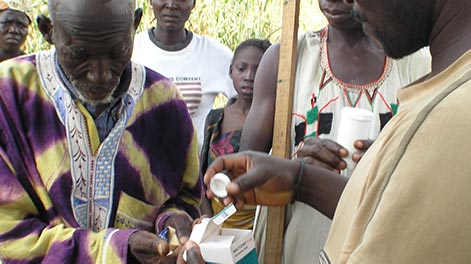 To help combat neglected tropical diseases suffered by millions of people, the Bill & Melinda Gates Foundation has pledged $10 million to fund two groundbreaking Carter Center initiatives in Nigeria.
Learn more »
To help combat neglected tropical diseases suffered by millions of people, the Bill & Melinda Gates Foundation has pledged $10 million to fund two groundbreaking Carter Center initiatives in Nigeria.
Learn more »
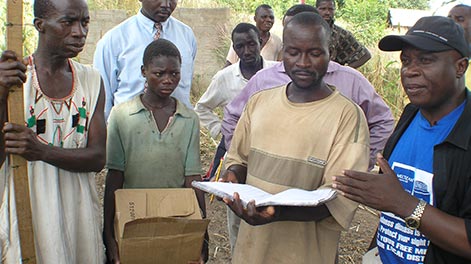 His name means "water" and "life" in the Southeastern region of his native Nigeria, and perhaps no name could be more appropriate for Dr. Emmanuel Miri, resident technical adviser for the Carter Center's health programs in Nigeria.
Learn more »
His name means "water" and "life" in the Southeastern region of his native Nigeria, and perhaps no name could be more appropriate for Dr. Emmanuel Miri, resident technical adviser for the Carter Center's health programs in Nigeria.
Learn more »
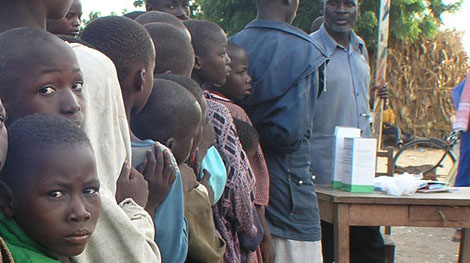 Anxiously queuing to be measured for treatment, a group of 5- to 14-year-olds listens to a health educator just off the main road that passes through their village of Kwa'al, Nigeria.
Learn more »
Anxiously queuing to be measured for treatment, a group of 5- to 14-year-olds listens to a health educator just off the main road that passes through their village of Kwa'al, Nigeria.
Learn more »
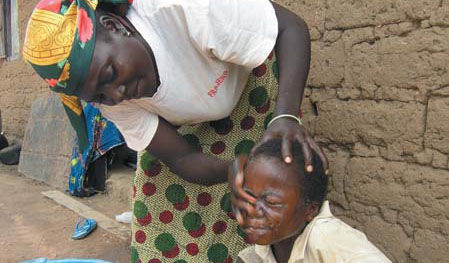 Imagine a nation almost half the size of the United States where large portions of the population are sick -- not with just one disease but several at once. Such is the daily reality for those living in Nigeria, a nation with one of the highest burdens of disease in Africa.
Learn more »
Imagine a nation almost half the size of the United States where large portions of the population are sick -- not with just one disease but several at once. Such is the daily reality for those living in Nigeria, a nation with one of the highest burdens of disease in Africa.
Learn more »